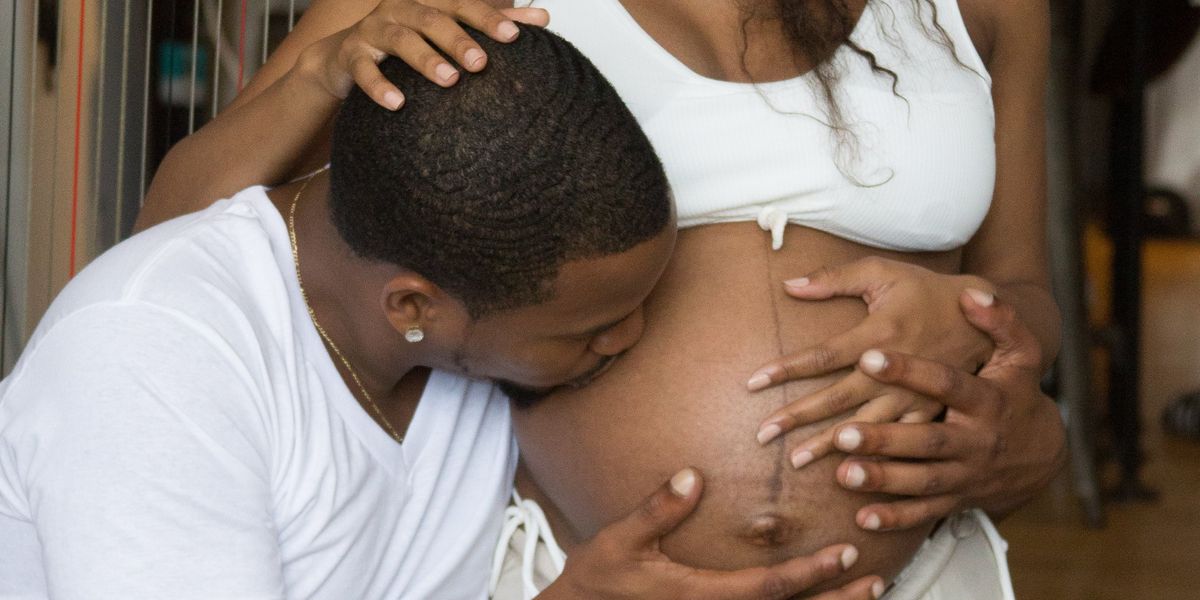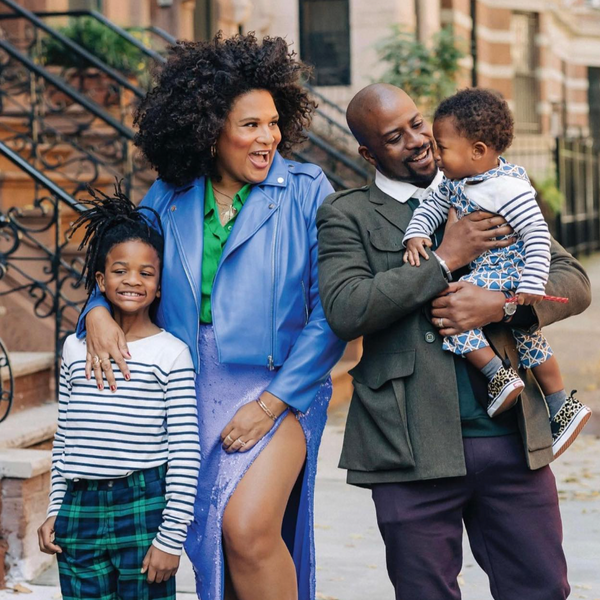
5 Ways Black Women Can Maintain Healthy Pregnancies
Pregnancy was the first time I didn't feel in control of my body.
When any first time mommy-to-be asks me what to expect because she is expecting, this is my go-to line. The lack of control, however is both beautiful and terrifying. There's the moment you realize that flutter of fetal movement referred to as "quickening" is probably your baby's feet and not gas from that Taco Bell chicken chalupa. Suddenly, it hits you there's a person growing inside of you and you have no control over when they decide to get into a more comfortable position, even if it means their elbow is in your spleen.
There was also the beginning of my third trimester where I found myself trying to organize the children's library at my job (I didn't know that my actions were a result of my maternal instinct to "nest") until I realized I couldn't bend over like a normal non-pregnant person, and had to squat to pick Dr. Seuss's collection up off the floor. Did I mention my husband couldn't hug me normally for about four months? There was also that point mid-pregnancy when I learned that a slight case of placenta previa made me a great candidate for a scheduled c-section.
This was actually a relief to me since while some women dream of natural childbirth, they were actual nightmares for me.
I've never felt a labor pain, nor do I want to.
The placenta previa, a condition where the placenta attaches itself too close to the cervix or actually covers it preventing the fetus to pass through, was the first time I truly felt like pregnancy had hijacked the driver's seat to my body and I was a helpless passenger whose only request was watermelon and grape tomatoes. When my OB/GYN first suspected that it might be an issue in the middle of my second trimester, she maintained that it wasn't too big of deal since my placenta was merely "too close for comfort" to my cervix but not actually covering it.
She decided the best option was to keep an eye on it for a few months with the hope that it would move. This meant plenty of ultrasounds for me, and great pics of my daughter playing with her thumbs in the womb, but also a few weeks playing the natural birth or scheduled c-section tango.
Even with the support of my spouse, family, and friends, awesome health insurance, and a chill, but skilled doctor, I was a bundle of anxiety. Although my doctor explained placenta previa "just happens" sometimes, I wasn't used to not being in control. Three years later, and I realize the lack of control was a subtle introduction to what parenthood can be most days. Today, I have a normal, healthy three-year-old whose favorite word is "no" and has literally watched the same Muppet Babies episode on the tablet at least 23 times in two days. But even with a pesky placenta and my iPad now being held hostage, I've realized that although pregnancy and parenthood can make you feel not entirely in control all of the time, that doesn't mean you have to feel powerless.
The CDC published a report earlier this year that shed light on the dangerous health threats that women of color are more likely to face during pregnancy. About 50,000 women suffer complications during pregnancy and black women are three to four times more likely to die than white women during pregnancy. What's even more alarming is that these statistics have as much to do with persistent poverty and inadequate healthcare as they have to do with health risks such as high blood pressure and diabetes.
I work on a sexual and reproductive health hotline during the day as Health Resource Specialist, meaning that many days, I'm one of the first people women talk to when they're facing a positive pregnancy test and the panic of not having health insurance. For some women, especially those who are parenting for the first time, hormones, and fear may have them wondering if they are going to be raising their child in a cardboard box by the time they're finished paying for healthcare, hospital stays, and childbirth costs or if they'll end up having their baby at home in the bathtub with the guidance of YouTube tutorial.
I try to help them balance their excitement with their anxiety by giving them the resources and education they need to feel empowered.
Regardless of their financial situation or the amount of support they may (or may not have), there are some steps every woman can take to ensure they are doing whatever is in their power to keep herself and her unborn child healthy:
Research prenatal care as early as possible, regardless of whether you have insurance or not.
I speak to far too many women who have put off prenatal care until their last trimester out of fear of outrageous clinic costs because they weren't insured. Fortunately in Philadelphia, there is an abundance of low-cost clinics or even hospital-based clinics that will assist in helping women apply for insurance through the state. Don't assume you're not eligible for certain programs based on your income or living situation. Explore your options regarding state assistance or even payment plans and programs offered through individual healthcare facilities. At the very least, research your local ER or hospitals that offer labor and delivery services so that in the event you do go into labor, you can have a safe delivery and work out payment later.
Choose a provider you feel comfortable with, both physically and emotionally.
I didn't know exactly what to look for in a provider but one of the factors I considered early in the game were distance (you'll have to travel regularly for appointments so you may want a place you can get to easily). In addition, look into appointment availability, if early Thursday afternoons work better for you don't be afraid to communicate that. A good provider will find a way to make sure prenatal care is convenient for you.
I also knew I preferred a female doctor. My OB/GYN was close in my age which means she was up-to-date on many guidelines and procedures, but she was also a young mother of two which meant she could relate to where I was in my life professionally and personally, and wasn't so far removed from the birthing experience herself. She did an awesome job at taking my concerns seriously while also helping to not create more anxiety for any hiccups that came along the way.
Your relationship with your OB/GYN is important. You'll develop a close relationship with this person and will see them often. Your OB/GYN should treat you with courtesy, respect, and if the connection just isn't working for you, you're well within your right to find another provider.
Take your symptoms seriously and when in doubt, seek your provider's assistance.
When it comes to health concerns, at its best, Google can be a great resource for information and at its worst, it can be an anxiety wormhole. Every pregnancy is different and what might be a normal symptom for one woman might be a cause for concern regarding your own pregnancy. In addition, every pregnancy is different. That morning sickness that was a foreign concept in your first pregnancy may have you changing your address to the bathroom floor in your second. When in doubt, consult your provider. Don't diagnose yourself via Wi-Fi.
Keep stress to a minimum.
My hormones were a mess during pregnancy and even with a solid support system, I found myself crying over everything from mismatched paint for the nursery to the release of TLC's 20 album. Choose your battles. A misspelled name on a baby shower cake is not worth the flood of hormones you're sending to your fetus while you spend hours crying in the backseat of your cousin's car. Trust me, you'll have the rest of your life to panic on a regularly scheduled basis once your child is actually here. So eat the cake and take some pictures so one day Lil' Dwyane can laugh too.
Don't disregard your postpartum care.
Pregnancy and childbirth, especially for mothers with limited or no support can bring added anxiety and stress into anyone's life, regardless of it's their first child or their fourth. This is why it's important to monitor your own well-being and take advantage of help when it's offered. If you have a few days of hospital stay, allow nurses to care for your baby or even take him or her to the nursery when you need rest. You'll have plenty of time once you're home to bond.
Also, whatever the case may be, make time for your "six-week check-up", even it doesn't happen until nine weeks after. An NPR piece from last year highlighted a study that found two-thirds of low-income black women never made it to their doctor visit but did find time to make sure their child made it to their first doctor's visit.
The lengths we go to to nurture our children always amazes me but self-care is just as important.
Touch bases with your provider to talk birth control, baby blues, or any other issues you're dealing with in those first few weeks of motherhood. Lastly, while help from family friends can help lighten the burden, trust your intuition when it comes to what kind of support you need and when. Don't feel like you must be everything to everyone.
Always remember, motherhood is personal and looks different on every woman.
Featured image by Andre Adjahoe on Unsplash
- How To Help A Child With Anxiety - xoNecole: Women's Interest, Love, Wellness, Beauty ›
- Black Pittsburgh Couple Double Pregnancy - xoNecole: Women's Interest, Love, Wellness, Beauty ›
- The quiet crisis among African Americans: Pregnancy and childbirth ... ›
- Childbirth is killing black women: 'This is a national problem' - CNN ›
- Stress From Racism May Be Causing African-American Babies To ... ›
- Maternal health statistics staggering for black women ›
- What It's Like to Be Black and Pregnant When You Know How ... ›
- How training doctors in implicit bias could save the lives of black ... ›
- Healthy Pregnancy | BlackDoctor ›
- Pregnancy-Related Deaths | Pregnancy | Reproductive Health | CDC ›
- Why America's Black Mothers and Babies Are in a Life-or-Death Crisis ›
- Nothing Protects Black Women From Dying in Pregnancy and ... ›
Writer, sexual health superhero, and #BlackGirlMagic and #BlackBoy curator regularly featured on @Madamenoire. Toya can usually be found in between her earbuds, listening to trap music and refreshing her browser for concert tickets. Tweet her @thetruetsharee.
ItGirl 100 Honors Black Women Who Create Culture & Put On For Their Cities
As they say, create the change you want to see in this world, besties. That’s why xoNecole linked up with Hyundai for the inaugural ItGirl 100 List, a celebration of 100 Genzennial women who aren’t afraid to pull up their own seats to the table. Across regions and industries, these women embody the essence of discovering self-value through purpose, honey! They're fierce, they’re ultra-creative, and we know they make their cities proud.
VIEW THE FULL ITGIRL 100 LIST HERE.
Don’t forget to also check out the ItGirl Directory, featuring 50 Black-woman-owned marketing and branding agencies, photographers and videographers, publicists, and more.
THE ITGIRL MEMO

I. An ItGirl puts on for her city and masters her self-worth through purpose.
II. An ItGirl celebrates all the things that make her unique.
III. An ItGirl empowers others to become the best versions of themselves.
IV. An ItGirl leads by example, inspiring others through her actions and integrity.
V. An ItGirl paves the way for authenticity and diversity in all aspects of life.
VI. An ItGirl uses the power of her voice to advocate for positive change in the world.
Let’s make things inbox official! Sign up for the xoNecole newsletter for daily love, wellness, career, and exclusive content delivered straight to your inbox.
Navigating Dating When Emotionally Unavailable & Detached: My Journey Back To Feeling
The last time I came with a dating story, I told you I got my little feelings hurt in 2021. I called myself trying to be out in these streets entertaining a man in a different area code, city, and state — only for homeboy to play in my damn face. So, I went and gave y’all "8 Rules To Casual Dating Every Woman Should Know This Summer." You’re welcome. Fast forward to 2024, and I am now coming to you from a more mature and intentional place. We’re not in summer yet, but I truly believe what blooms in spring, thrives in summer.
2023 was my year, and it was my turn. I had just completed an 8-month holistic detox. The glow-up was real and well-deserved. The way I have poured into myself is unmatched. Let me tell you, self-love is a love you have never known. After a five-year healing journey, I finally felt like myself again, and I was ready to play. My heart was open, my mind was clear, and my body hella transformed. I had told all my friends that I was ready to explore dating again, and at the height of summer, I did exactly just that.
This time I decided I wanted to take my time. I wanted to date the “right way” or the “healthy way.” You know, keep your options open, ask the right questions, believe actions and not words, observe patterns and pay attention to red, yellow, and green flags. I was never the dating app type of girl. I sincerely miss everything about human connection and dating from 2000 to 2012. Can we please bring all of that back into 2024? I prefer to feel a man’s energy and presence in real-time. Nonetheless, I still chose to dabble with a few dating apps. I was all the way outside and dating for practice.
Unfortunately, with today’s dating culture, social climate, and how some of these men move and/or behave, these dates were a dead end. Not one guy made it to my roster. What these men were was benched this season – not one of them could be my first-round select draft pick. It didn't seem like anyone I met was interested in a serious relationship. And it’s completely fine. Miss me with the ghosting, lack of effort, inconsistency, and poor communication. I continued to just do me because what is for me will not miss me.

Kelvin Murray/ Getty Images
The universe must have heard me talking because I had specifically told my closest girlfriends that I wanted to meet someone who lived in the vicinity, no more than twenty minutes away, and no more long distance. And I did meet him (it’s crazy how I manifest exactly what I want). As we started to get to know each other, I liked his energy and effort. I liked the direction it seemed to be going to the point my girlfriends had to tell me not to run from him. Because every part of me wanted to run from something that seemed normal.
I liked what he was coming with until I became uncomfortable with my own feelings, and I didn’t know how to communicate them to him.
With that said, I knew if I truly wanted to experience the truest of loves, a reciprocal, requited love, and be in a healthy relationship this story had to come to a pause. What I didn’t know was that he was going to show me things I didn’t know I needed to work on. I didn’t know he inadvertently was going to help me continue to heal parts of me that were hidden.
As someone who has learned to self-heal, I am no longer the type that runs from herself. I am here for the growth.
The truth is I am emotionally detached from myself, and I am not actively dating at the moment. I am the one that has to work on herself. My reiki healer called it, too – she told me this year would not be a year for a relationship, but a year of continuous growth. And now I see why. After all the healing work I have done thus far – I am an unemotional mess. How?
At my big age of 39, I struggle to communicate my wants and needs.
I still struggle to communicate and process uncomfortable feelings. I would rather give myself anxiety, act nonchalantly, emotionally react, and choose non-communication when I am bothered with someone than address the issue (I will later explain why). I have been ignoring my feelings for so long it has become a habit, a defense mechanism, and more so a trauma response.
If you are someone like me who grew up in a household that didn’t discuss feelings, your emotional needs were unmet, and you don’t feel safe to share your feelings – emotional detachment is quite common.
Oftentimes, we always talk about men being emotionally unavailable, but what if it’s a woman who is emotionally unavailable or emotionally detached? How does she navigate herself, dating, or being in a relationship? As I navigate my emotions this season, let’s explore what it means to be emotionally detached, the signs of detachment, and how to reconnect with yourself emotionally.
Emotional Unavailability vs. Emotional Detachment
When we look at the terminology emotional unavailability and emotional detachment, one might argue that the two terms are interchangeable and have the same meaning. One could also argue that both terms mean that some people are not in tune with their emotions or lack the emotional capacity to be responsive to someone else’s emotions. Fair enough. However, there is a big difference. The definition of emotional unavailability is described as people who have difficulty with sharing their emotions and being receptive to the emotions of those around them.
According to Verywell Mind, signs of emotional unavailability can look like being distant or cold, lack of closeness, and emotional intimacy in relationships, inability to understand and relate to others’ feelings, defensiveness when asked to change or let others in, tendency to shut down or avoid topics that require emotional openness, or withdrawal from people or situations that provoke emotional reactions.
 GIF by Kim's ConvenienceGiphy
GIF by Kim's ConvenienceGiphyWhereas emotional detachment is defined as the inability to or willingness to connect with others on an emotional level. Furthermore, Psychology Today states emotional detachment can also mean that people do not engage with their feelings. Exhibit A – me. Emotional detachment has various causes – past neglect, childhood or adult trauma, PTSD, depression, personality disorder, bipolar disorder, substance abuse, or, in some cases, medication (i.e. antidepressants). It is important to note emotional detachment is a complex issue. For someone like me, it’s a coping mechanism.
It is easier for me to ignore uncomfortable feelings to protect myself from stress or getting hurt. Hence, my nonchalant demeanor. It is also true for some people it is a reaction to trauma, abuse, and unprocessed emotions. Exhibit B – me. As it is difficult for me to open up about my feelings at the moment. On the contrary – emotional detachment can be helpful in navigating some situations like listening to people’s opinions and gossip.
Unfortunately, emotional detachment is not a behavior that can be turned on and off at will. Please note that emotional detachment is NOT a mental health diagnosis but can be a symptom of a mental health condition such as an attachment disorder. And if you know anything about attachment theory, it is related to the relationship we develop in our childhood with our primary caregivers.
Signs You're Emotionally Detached

Mavocado/ Getty Images
According to Psychology Today and Verywell Mind, general signs of emotional detachment can look like difficulty showing empathy to others, sharing emotions, committing to a relationship, feeling numb, poor listening skills, lack of self-esteem, preferring to be alone, struggling to feel positive emotions, inability to identify emotions, lack of physical, verbal, or sexual contact and losing touch with people or maintaining connections.
In a romantic relationship, emotional detachment shows up as you or your partner not being available for connection, poor communication, or reduced affection.
For me, my experience with emotional detachment is collective. I am an empath to my core. I don’t have a problem relating to other’s feelings or circumstances. I don’t have commitment issues, nor do I have an issue connecting with others or maintaining those connections. I struggle with sharing emotions, at least the negative ones.
Due to the emotional abuse from my childhood and a toxic relationship, I learned sharing emotions just wasn't the safe thing to do. As a survivor of trauma, I learned to suppress feeling negative emotions in general as a form of protection.
How To Reconnect To Your Emotions When You're Emotionally Unavailable
 Serious Kid Cudi GIF by Apple MusicGiphy
Serious Kid Cudi GIF by Apple MusicGiphyExploring my emotional side in-depth started late last year simply by noticing my reaction to something that he did. I didn’t know how to properly communicate to him how I was feeling or what he did bothered me in the moment. So, I swallowed my feelings and said absolutely nothing. I intentionally chose to avoid the issue. I chose to rationalize the situation instead of acknowledging that my feelings at the time were valid. I chose to act like everything was all good because it was all good.
“It wasn’t that deep to begin with” is what I told myself. And this is where the problem lies.
The saying is true, “What happens in your childhood shows up in your adult relationships.” I came to realize that because I was not able to express my feelings as a child, I struggled to process them. I either hold back my feelings, take a long time to say how I feel, or don’t say anything at all. This is because I fear people will walk away from me like my mother did if I share what I truly feel. I fear my feelings won’t be validated, or they will be rejected.
With that said, I was completely unaware that I was emotionally detached from myself until recently. So, here we are with this article. It all started by reading Instagram’s @theholisticpsychologist, Dr. Nicole LePera’s newest book How to Be the Love You Seek: Break Cycles, Find Peace, and Heal Your Relationships, which was released on November 28, 2023. As I read through the first chapter, I became triggered.
How Dr. LePera describes her childhood with her parents and experiences with her romantic partners somewhat mirrored my experiences with my own parents and relationships. As Dr. LaPera stated in her book, I have no issue showing up for others or meeting their needs and wants. But when it comes to expressing my own needs and wants – I cannot or I don’t. This is mainly due to my hyper-independence.
At an early age, I learned to show up for myself because the people I trusted to show up for me failed. Given my home environment, I had internalized it is not safe to talk about feelings. I never knew my emotional responses and behavior were abnormal. But because I am willing to continue to do my inner work, I know that I can reconnect to my emotions, and undo four decades of repressed emotions.
If you are someone like me who struggles with emotional connection with yourself and others, here is how you go about it:

Lighthouse Films/ Getty Images
1. Know Your Attachment Style
For me, the first step was to understand my attachment style. I asked my therapist if she could help me identify my attachment style to understand my triggers. She recommended The Attachment Theory Workbook by Annie Chen, LMFT. My therapist administered the associated online quiz – Attachment Quiz. If you haven’t figured out my attachment style yet by reading this article, I have an anxious attachment style.
This means I don’t do well with inconsistent behavior, especially from men (but I’m the type that holds men to standards too). People with an anxious attachment style have a need to feel close to their partner. It may come across as “clingy” or “needy.” However, this same need is often driven by fear of abandonment, mistrust, and low self-esteem. I would say knowing your attachment style is helpful because you can work towards having a secure attachment style (with practice) in your relationships – familial, business, work, platonic, or romantic.
2. Become Self-Aware
Most people who are not in the practice of self-care or self-healing are unaware of their triggers, patterns, and behaviors. We are so caught up in the daily minutiae of life that we forget to pay attention to the most important part of our days — ourselves. As Dr. LePera says, make it a conscious habit to pause throughout your day to check in with yourself. Ask yourself:
- How does my body feel?
- What am I doing right now?
- Am I present?
- Am I distracted and lost with other thoughts?
- What do I think or feel when I recall a specific experience with someone?
- What do I think or worry about?
- What would happen if I shared my authentic thoughts, perspective, feelings right now?”
This is what Dr. LePera refers to as exploring your embodied self or fulfilling your authentic needs in chapter two of her book. Consistent mindfulness and self-awareness are key to self-discovery and in any healing journey. Learning to focus on the present moment also includes paying attention to our emotional response to an event or how we think about emotions in general.
3. Practice Vulnerability
The idea of vulnerability is a tough one for me and so many other women for countless reasons. Whether it be toxic family, friendships, relationships, or trauma – trusting others with your thoughts and feelings is not easy. As much as I am open and transparent, I am not as vulnerable. And I believe there is so much power in the duality to be both. To trust someone, let alone a man with your authentic self is a delicate matter.
But it is emotional vulnerability that allows us humans to build authentic connections, create stronger relationships, and break down emotional walls. Emotional vulnerability is not something to be rushed – it takes time and practice from you and the people you choose to have in your life. Medical News Today suggests that we can learn to be vulnerable by opening up more to our closest friends, building our ability to become more trusting, and developing skills to regulate our emotions.
4. Seek Therapy
I have been in therapy for six years and counting. I would consider therapy one of my safe spaces. I am one of those individuals who recommend therapy to everyone as it has given me the tools and resources I need to navigate my life challenges. By choosing to get help, I was able to put my PTSD and depression in remission for four years now. I have also learned how to manage my anxiety.
I am fully aware that in this season of my life requires me to do the work to unlock new levels of self. And any time where I have consciously chosen growth – the universe or life has not failed me. I was able to heal my body, my heart, and my spirit. Now, it’s time to heal my inner child, this hurt little girl who lives in me.
I will say choosing a therapist is similar to dating; you might go through a few potentials until you find a therapist you connect with. Actually, one of my lifelong friends said to me the other day, “Your relationship with your therapist is one of the most important relationships in your life.” I needed her to say that, and I needed to hear it because it’s true. You are essentially trusting a licensed stranger to help you navigate your life on so many levels.
Be picky and ask the questions. Cut the cord at the first red flag given. Again, let me reiterate that emotional detachment is not a mental health diagnosis. It can be treated with the help of a therapist. Emotional detachment only becomes a problem when it starts to interfere with your daily life. Pay attention to changes in your daily behavior and make decisions to cope accordingly.
I am genuinely excited about reconnecting with my emotions. I want to feel all the feels – good, bad, and indifferent. I want to cry all the tears – especially the sad ones. I want to process and release negative emotions. I want to say how I feel in the moment with no fear.
If you are that girl who struggles with emotional connection or thinks you're emotionally detached, I hope that you become willing to face your inner child and show up for her. Don’t run – she has been waiting for you.
Let’s make things inbox official! Sign up for the xoNecole newsletter for daily love, wellness, career, and exclusive content delivered straight to your inbox.
Feature image by fizkes/ Getty Images











